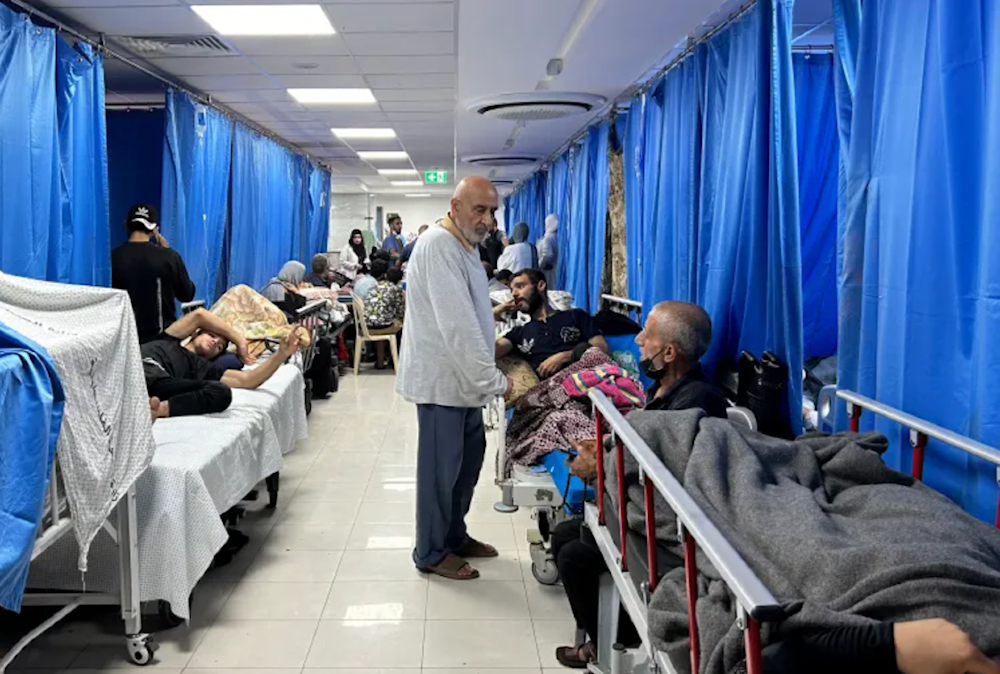10,000 cancer patients in Gaza lack life-saving treatment
Cancer patients in the besieged zone are subjected to "unbearable" and "inhumane" conditions.
-

Patients and internally displaced people at Al-Shifa Hospital in Gaza City on November 10, 2023 (AFP)
More than 10,000 cancer patients in Gaza lack access to life-saving treatment as a result of the forced closure of the lone cancer hospital during the Israeli aggression on Gaza, according to health officials.
Cancer patients in the besieged Strip are subjected to "unbearable" and "inhumane" conditions, according to Palestinian news agency WAFA.
Individuals also do not have access to specialist cancer therapy medications, the agency added, making their already tough conditions much worse.
Dr. Subhi Skaik, director of the cancer hospital, expressed in a Monday statement that “after the Turkish-Palestinian Friendship Hospital for Cancer was forced to go out of service, 10,000 cancer patients are facing compelling and inhumane circumstances."
Israeli airstrikes on the Palestinian-Turkish Friendship Hospital on October 30 caused severe damage and rendered the institution inoperable.
Palestinian health officials also announced that the hospital had been shut down due to a lack of fuel due to the Israeli regime's devastating blockade of the strip.
The hospital, which the Turkish government funds, is one of Palestine's major specialized medical institutions.
The loss of this critical medical facility aggravates an already difficult scenario for cancer patients in the besieged Strip.
WHO chief Tedros Adhanom Ghebreyesus called the strikes on the hospital "terribly concerning" at the time, explaining that the care is literally a matter of life or death.
The World Health Organization has issued yet another dire warning about the deteriorating state of healthcare facilities in the Gaza Strip.
The current fuel scarcity has made providing basic healthcare services exceedingly difficult, since key hospital equipment cannot run, placing people in intensive care units in danger.
IOF target hospitals
The UN Office for the Coordination of Humanitarian Affairs (OCHA) warned against the spread of infectious diseases in the Gaza Strip, as its people face an ongoing Israeli aggression.
Factors, deliberately induced by the Israeli occupation's aggression, have spurred the spreading of infectious diseases in the besieged Gaza Strip. Israeli measures, such as the forced displacement of hundreds of thousands of people from the northern Gaza Strip toward southern regions, have contributed to the proliferation of diseases, as thousands of people were clumped up in severely underequipped shelters, schools, and hospitals.
OCHA revealed that about 180,000 people have been diagnosed with upper respiratory infections, while more than 136,000 cases of diarrhea were recorded among Gazans. This comes as Israeli authorities tighten their siege on the Strip, allowing measly amounts of water into the Strip, forcing Gazans to turn to salinated and untreated sources of water, which has had detrimental effects on their health.
Adding to the torment of Palestinians, the Israeli occupation put tens of hospitals and medical centers out of service, severely impacting the potency of medical care.
OCHA's report reveals that increased cases of infectious diseases have increased pressure on the health system, which deals with hundreds of wounded people daily.
The aforementioned factors come as a direct result of the Israeli aggression, in which Israeli occupation forces have actively blocked the entry of medical supplies, food, and water into the Strip, attacked hospitals and medical staff, and forcibly displaced hundreds of thousands from their residences.

 3 Min Read
3 Min Read








